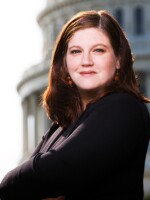This election season, more money than ever is flowing from supposedly nonpolitical groups into TV ad campaigns.
Most of the ads are negative, sponsored by ambiguously named organizations like "Americans for Job Security" and "The Commission on Hope Growth and Opportunity." Who are those groups?
Some of the ads can be seen in Pittsburgh, the site of three fierce races: two for the House and one for the Senate.
Pittsburgh TV stations are airing as many ads now as they used to run in the last fiery days of a campaign season.
Each local station is airing 12 or 14 ads per hour during the evening news, but they are not all the same. Some come from the candidates themselves. Others come from party committees like the Democratic Senatorial Campaign Committee or the National Republican Senatorial Committee. Still others come from other groups.
Tracking Down Ads
Two such groups advertising in Pittsburgh are Americans for Job Security and the U.S. Chamber of Commerce. Both are 501(c)s, organized under the tax code as nonprofits. The law says they can't engage in politics as their primary purpose. It also says they can accept unlimited donations and don't have to report their donors. Couple that with the U.S. Supreme Court's Citizens United ruling, and you have a wide-open path for corporate money to flow into partisan politics.
That's what makes these ads different from those by party committees: Candidates and party committees have legal limits on the size of donations they can take from each donor, and they have to report the names and numbers of the donors and how much they gave. It gives context to the ad.
There's almost no context with the noncandidate, nonparty, supposedly nonpolitical groups. But they do have to disclose something -- not to voters, but to the TV stations. And whatever they disclose to the TV stations, the stations must disclose to the public. It's the only way to track down how many ads these groups are running and just how much they are spending.
Incomplete Paperwork
At TV station WTAE, the ABC affiliate in Pittsburgh, the political file documents all of the political advertising the station has sold for this election cycle. You can expect to find records of who has been buying ads, how much they have been paying for them and, in a very general way, why they say they are buying them.
For instance, the U.S. Chamber of Commerce, one of the most powerful voices in these midterm elections, logged 206 ads at WTAE in a period of three weeks for the Senate race and two House races. The cost: $134,000. That's for one station, in one market, in the chamber's nationwide campaign.
There are also many disclosure forms (see examples in box below) that give less than full disclosure; parts of the form are blank, and that's not atypical.
At KDKA, another TV station, there are more huge ad buys: On Sept. 7, the group Americans for Job Security booked a month worth of ads for which it paid $105,560 and left incomplete paperwork.
The group is required to fill in the name of the candidate that the ad is talking about, but it left the field blank. The ads it runs specifically mention the Democratic incumbents being attacked. The group is also supposed to declare whether the ad is talking about a national issue, and if it is, which candidates it names. Americans for Job Security left it blank.
Although the groups are filing their paperwork with stations, they are not taking it seriously. Some answer a few questions; most leave the important lines blank. It's an indication that TV stations can't act as a watchdog of these groups.
Unprecedented Spending
NPR tried to contract some of the groups behind these ads. They either said they were busy and that they are complying with the law, or they didn't return the calls. And they don't have to.
For most of these groups, there's almost nothing required in terms of donor disclosure. They can keep their funding sources comfortably hidden. But they are spending amounts of money that were unimaginable just a few years ago.
One group can easily spend $100,000 or more at one station in a few weeks. Multiply that by four or five local stations in each area, and five or six groups spending at that level, and the amount of money flowing from secret sources to fund attack ads across the nation is easily in the hundreds of millions of dollars.
The ads in Pittsburgh attacked candidates of both parties, but the ones attacking Republicans were all from Democratic candidates or party committees, groups that have to disclose their donors. Not one ad from the supposedly nonpolitical groups attacked a Republican. All of those ads are aimed at Democrats.
This year, in the wake of Citizens United and other court decisions, corporations and rich donors can give as much cash as they like to these groups. But it's unclear who the groups are.
In Part 2, which will air on All Things Considered on Thursday, we talk to a candidate being attacked and a campaign benefiting from a third-party ad. Also, voters discuss what they think of the ads.
Copyright 2022 NPR. To see more, visit https://www.npr.org. 9(MDAzMjM2NDYzMDEyMzc1Njk5NjAxNzY3OQ001))







